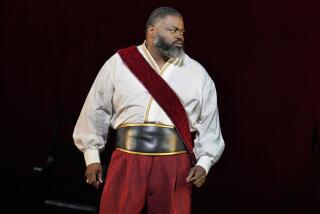OBITUARIES : James McCracken; Tenor Was One of Great ‘Otellos’
- Share via
James McCracken, the barrel-chested tenor who became one of the world’s great “Otellos,” has died of the complications of a stroke.
The 6-foot, 250-pound McCracken, whose feuds with the Metropolitan Opera provided nearly as many press clippings as did his hundreds of operatic performances, was 61 when he died Saturday at Roosevelt Hospital in New York City.
He had entered the hospital last month after suffering an initial stroke and died when felled by a second, a spokesman said.
The son of a Gary, Ind., fire chief who worked as a youth in the steel mills, McCracken was embarked upon his third career at the Met when he died. He made his debut there in 1953 singing Parpignol, the toy vendor, in “La Boheme.” He left in 1957 in a dispute over the quality of roles he was being assigned, returned in 1963 after a series of triumphant “Otellos” elsewhere but left again in 1978 when he was refused an opportunity to appear on national television.
When he returned to sing in the Met’s 1983 centennial gala it reportedly was the first time in the company’s history that an artist who had walked out two times had been re-engaged.
Metropolitan Opera Director James Levine once said of McCracken, “You can count on the fingers of one hand the singers in the world at any time who can sing the roles he sings.”
He specialized in the larger-than-life Italian roles in opera; Calaf in “Turandot,” Canio in “Pagliacci,” “Radames in “Aida” and Don Carlo in “La Forza del Destino.”
He also was heard in operas ranging from “Carmen” to “Tannhauser” to “Samson and Delilah.” He sang “Samson” for the first time in 1954 in Norfolk, Va., and his “Delilah” was the mezzo-soprano Sandra Warfield, who soon became his wife.
Born in Gary, McCracken supported himself as a youth by working as a scarfer in the steel mills, removing scales from ingots with a blowtorch. During World War II, he worked in the sonar division of the Great Lakes Naval Station and was a member of the Blue Jackets Choir.
Upon discharge, he studied at Columbia University and had small roles in Broadway musicals. He made his operatic debut as Rodolfo in “Boheme” in Central City, Colo., in 1952.
After his first quarrel with the Met he moved to Europe in a bid for bigger roles and wrote of his struggles for recognition in a 1971 book, “A Star in the Family.”
He returned to the Met in 1963 to sing “Otello,” establishing his supremacy over that role.
“He probably sang ‘Otello’ more than any other tenor in the world,” said Alix Williamson, his former publicist.
A resident of Switzerland, McCracken kept a Manhattan apartment and was scheduled to perform in April in the Met’s “Il Trovatore.” But he fell ill in late March and suffered a stroke several weeks later, Williamson said.
McCracken’s critical notices improved rather than diminished with age. Last November, reviewing the San Francisco Opera’s performance of Beethoven’s “Fidelio,” The Times’ Martin Bernheimer lauded his portrayal of Florestan.
“One or two other singers may explore the light and shade in the second-act aria with more refinement. Some, no doubt, can sustain the high tessitura without allowing the pitch to sag, as McCracken occasionally does here. But few contemporary tenors of any age can sing this cruel role with such force, such stamina, such intensity of expression and authority.”
More to Read
The biggest entertainment stories
Get our big stories about Hollywood, film, television, music, arts, culture and more right in your inbox as soon as they publish.
You may occasionally receive promotional content from the Los Angeles Times.










